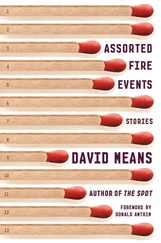Before we left that day we conducted a dry run of commands and gestures, scuffing through charcoal dust in the dreary afternoon light, drawing together into a huddle formation, arms over shoulders, trying to establish a sense of camaraderie, a communal intent, an esprit de corps so tight and consuming that it would — when the time came — allow for an intuitive coordination of gestures, the kind of cohesion of action that comes from knowing a role by heart, pure muscle memory and nothing else, so that when we were done with the heist and making our getaway, we’d carry only physical sensations — twitches, cold gun metal, a grimace. Nothing useful for an interrogator to piece together. No dots to connect, Donnie said. No consistency in the story from one man to the next. Again, the idea would be to make sure we factored in the old codger and the solitude his face might contain, having, most likely, lived a widower’s life the past five years or so (All widowers, these bank guards in Ohio, Carson said). One must factor in a no-nonsense attitude on his part, forged in confrontations with the likes of Dillinger. If not top guys, then at least bootleggers making the West Virginia — Cleveland run. Not so much the Capone gang per se, although Capone’s shadow had loomed all the way down into these parts, but more likely bit players with nothing to lose. Most likely the codger had had at least one genuine run-in with a stickup artist over the course of a long career in these parts. Guys like Jim Molloy and Stark Wallhouse — running product down from Pittsburgh, speaking in their snappy, big-city vernacular, riding roughshod over the law — have left a bitter taste in the mouths of retired cops all over the state. Idea will be to show a bit of panache in the way we handle things, so that the old codger and the other victims sense that the outcome is simply out of their hands and follow the easiest course, moving as directed, moving to the right-hand side of the room (always the right) while in the back the bagman collects the money. Idea being not to spook, but to keep the fear level steady and cool. Closing the blinds, if necessary, and trusting in the wider dynamic. Idea is to entrust the job not to the hands of some kind of fate, Donnie explained, relighting his cigar, rolling the tip in the flame, taking a couple of deep draws, sucking hard, trying to get the smoke from one end to the other. But rather to tap into the rubbery nature of all that cash, eager to be relieved of the restrictions of the bank. The idea being that most good folks will side with the money and, in turn, with us. After so many years in the desolate countryside — in particular the Mennonite-slash-Amish, tired of all that harness adjusting, the hard clop of shoe iron on modern roads, the wheel hoops sparking the pavement, not to mention sunup-to-sundown toil, trying to make ends meet without most of the modern conveniences — they will side with the monetary release and, as a result, secretly root for our success while recognizing, I might add, he said, taking another deep puff, the ethos of our work and the fact that we’re Robin Hoods of a sort, doing our best to free the money from its reluctant association with the bank and the big syndicate empires of speculation. Idea is to assure them — through the stateliness of our behavior — that the money will land in the hands of men who have suffered indirectly from the Great Depression years, at the hands of parents who had scrimped and scraped, rode the rails (my old man), gone door to door begging meals (my old man), sold apples on the streets (Carson’s old man), ran backwoods stills down in Clark County (Donnie’s old man), lived hand to mouth by their wits, only to come out of those years hardened in a smithy of desperation, the skin tight around their jaws (my father), ready to beat thriftiness into their sons (all of our fathers). Suffering while the syndicate men hooked their thumbs into their vests, spread their fingers across their fat bellies, and retreated to their oak-paneled dens to ride out the storm. Idea is to take advantage of the fact that the heist itself will cause most of the folks in the bank to look back at a time when those of our ilk were heroes while we, for our part, make a getaway into the future, tearing out of town with a flamboyant wildness that comes from knowing — after belt whippings, after knuckle rapping, after verbal berating — that what we have in hand is rightly ours, for keeps.
The flex of time against unmitigated factors. The intrusion of the unknown into the idea of the heist in such a way that you cannot possibly attribute the botch that transpired to a failure of planning. It came with the folks who were there from the start, not only the old security codger — named Ed, Earl, or Ike — but also those in line, including the Old Order Mennonite who turned at Donnie’s commands to present placid eyes and a grim mouth. He held the look of a man who was obligated to only one commander. A few of the farmer types stayed put until they saw the gun barrel. Then the line bowed — a small towheaded boy, two women who were just about to shriek — until Donnie went up to the Mennonite and put the gun close in, not touching but close enough to give him something to really think about. (And the man did think. You could see it in his pale, serene gaze. In the way he lifted his shoulders slightly. He had that neat, tidy composure that came from the grace of God, I thought at the window, glancing out at the street and then back inside, trying to keep my head clear, to see both sides of the coin, so to speak.) Donnie moved close and a tension formed. Meanwhile, in the back, Carson was working the bagman routine, hefting his tommy gun, scaring up some cash. In those first few moments everything unfolded. The security codger was on his side, on the floor. (We’d pistol-whipped him first, taking him by surprise and from behind, sending him down to the floor for a few kicks, his gun pinwheeling away. He was there for a reason, we knew, and that reason was if not to resist then to look startled and frail, to make us feel a bit more of the guilt that came from our obligations; just as the small kid, the towheaded one, was there to remind us that we had a duty to avoid the botch, to make things run smoothly, if possible, and to keep order.) But the Old Order Mennonite stood firm and absorbed the orders — Donnie was barking hard at him, his neck straining — while the ladies cried, tipping their heads back slightly, exposing the napes of their necks, making birdlike motions, as if waiting to be fed, while back behind the counters Carson bustled. Everything was smooth from my vantage. Everything was moving neatly along the general plan, even the Old Order Mennonite, who was a factor already factored in. Bags were being filled up, and Carson’s talent for getting action out of the tip of his gun, of turning fear into motion, was in full play. He rocked the gun against his hip and worked it slowly in relation to his thin, lean, whiplash Okie frame, carrying himself with a formality, a politeness that was tight to his jaw. Just hearing the snap in his voice you know that everything sluiced down into a particular moment, a void of air where money slipped into those bags. The tart tension of those bags! The feeling in the air of transaction! Time fluxed around a point in space near Carson. It bent around the fear and fluxed smoothly around the Old Order Mennonite (or Old Order Amish), pouring around him as he held his ground, his spit-shined shoes tight to the floor.
Idea was to glance out at the view — the clean vista of Third Avenue to the west, and Cedar Street to the east — and then inside for a few seconds before glancing out again, finding the right balance and speed to hold both (inside and outside) in mind at the same time; never really taking my eye off the ball, so to speak, and in that manner backing up Donnie and maybe even Carson, who might need me to run back to help with the loot. Idea was to find a groove and to stay in it, not losing the sense that the outside world was inside, too, in a way, and in that manner also — and this defies logic, but then so does a good heist — assure that no one would come wandering in to disrupt the job.
Читать дальше












